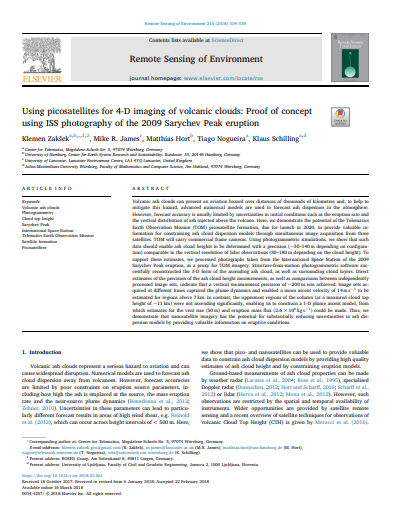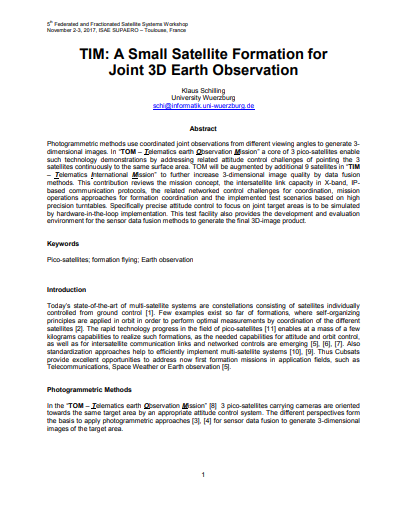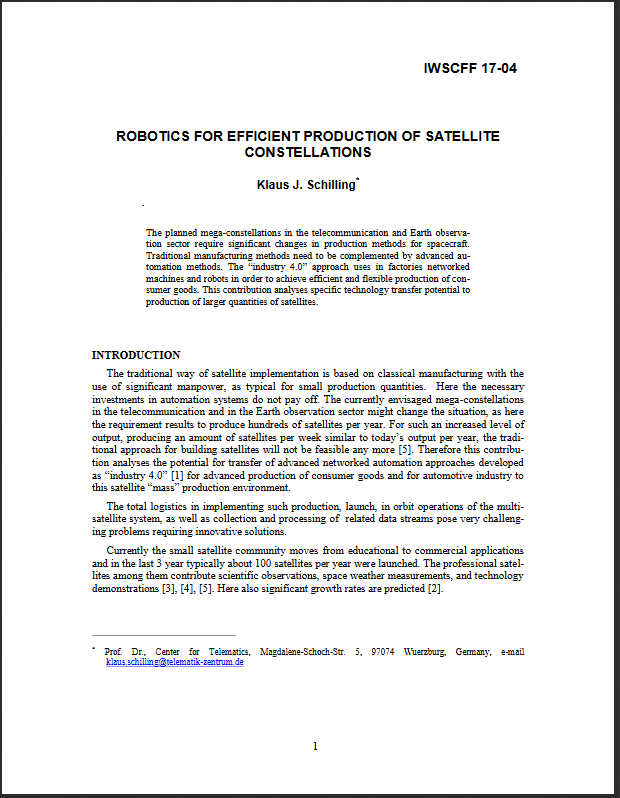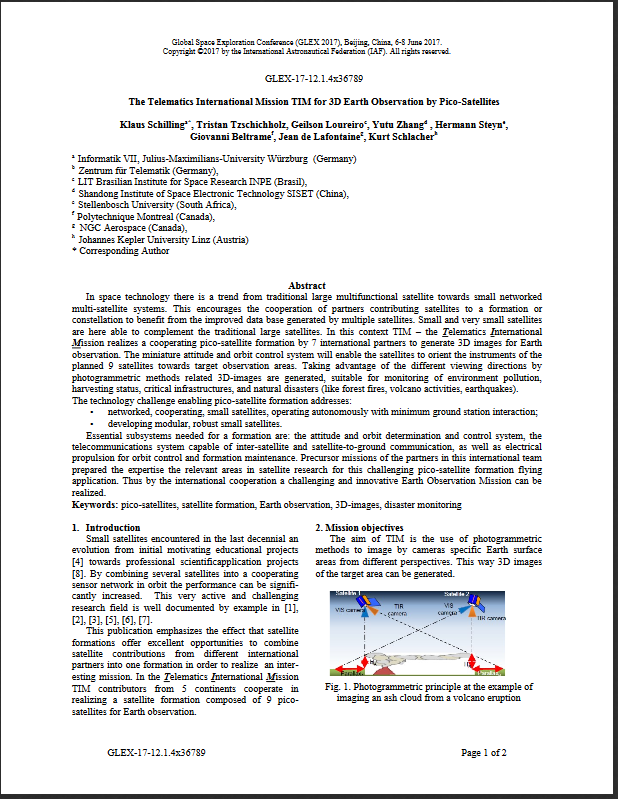Small Satellite Formations to Characterize 3D Cloud Properties: TOM and CloudCTK. Schilling, Y. Schechner, I. Koren;
Small Satellite Formations to Characterize 3D Cloud Properties: TOM and CloudCT Proceedings 4th COSPAR Symposium on "Small satellites for sustainable Science And Development Herzliya, Israel, 2019 |
TIM: An International Formation for Earth Observation with CubeSatsA. Kleinschrodt, I. Motroniuk, A. Aumann, I. Mammadov, M. Hladky, M. Bilal, A. Freimann, L. Minshi, J. Lianxiang, F. Malan, H. Burger, G. Beltrame, K. Schilling
TIM: An International Formation for Earth Observation with CubeSats Proceedings 12th IAA symposium on Small Satellites for Earth Observation, Berlin,. 2019. IAA-B12-1502 |
TIM: An international nano-satellite formation for photogrammetric earth observation
K. Schilling, G. Loureiro,Y. Zhang, A. Nüuchter, J. Scharnagl, I. Motroniuk, A. Aumann
TIM: An international nano-satellite formation for photogrammetric earth observation Proceedings 70th International Astronautical Congress . 2019. IAC-19 B4.7.54915 |
Mission Planning for the TIM Nanosatellite Remote Sensing Constellation
A. Kleinschrodt; T. Nogueira; N. Reed & K. Schilling
“Mission Planning for the TIM Nanosatellite Remote Sensing Constellation” 69th International Astronautical Congress (IAC), Bremen, Germany, 2018 |
Using Picosatellites for 4D-imaging of Volcanic Clouds: Proof of Concept Using ISS Photography of the 2009 Sarychev Peak EruptionZakšek, K.; James, M.R.; Hort, M.; Nogueira, T.; Schilling, K.;
Using Picosatellites for 4D-imaging of Volcanic Clouds: Proof of Concept Using ISS Photography of the 2009 Sarychev Peak Eruption Journal Remote Sensing of Environment, Vol. 210 (2018), pp: 519-530, 2018 Read the paper here. |
TOM – a pico satellite formation for 3D earth observation
K. Schilling, A. Aumann, I. Motroniuk, I. Mammadov, D. Garbe, O. Ruf, V. Dombrovski, M. Hladky and A. Nüchter
"TOM – a pico satellite formation for 3D earth observation" In The 4S Symposium, 2018. |
Lessons learned in 20 years of application of Systems Concurrent Engineering to space productsG. Loureiro, W.F. Panades, A. Silva
“Lessons learned in 20 years of application of Systems Concurrent Engineering to space products” Acta Astronautica 151 (2018), p. 44–52. |
Prototypen-Mission für die Erstellung von 3D Wolkenhöhenkarten - Kleinstsatelliten für ErdbeobachtungA. Aumann, I. Motroniuk , I. Mammadov, J. Scharnagl, K. Schilling,
''Prototypen-Mission für die Erstellung von 3D Wolkenhöhenkarten - Kleinstsatelliten für Erdbeobachtung“ Work-shop AK Umweltinformationssysteme, 2018 |
TIM – A Small Satellite Formation for Earth Observation
Schilling, K.;
TIM – A Small Satellite Formation for Earth Observation Proceedings 9th International Workshop on Satellite Constellations and Formation Flying, Boulder . 2017, IWSCFF 17-67 Read the paper here. |
Telematics Earth Observation MissionZakšek, K.; Haber, R.; Tzschichholz, T.; Nogueira, T.; Dombrovski, S.; Busch, S.; Niklasch, N.; Schilling, K.;
Telematics Earth Observation Mission IAA Symposium on Small Satellites for Earth Observation. 2017, IAA-B11-0409P |
TIM- A Small Satellite Formation for Earth Observation
K. Schilling
“TIM - A Small Satellite Formation for Earth Observation”,Proceedings 9th International Workshop on Satellite Constellations and Formation Flying , 2017 |
Robotics for Efficient Production of Satellite Constellations
K. Schilling
“Robotics for Efficient Production of Satellite Constellations “ Proceedings 9th International Workshop on Satellite Constellations and Formation Flying , 2017 Read the paper here. |
The Telematics International Mission TIM for 3D Earth Observation by Pico-Satellites
K. Schilling, T. Tzschichholz, G. Loureiro, Y. Zhang, H. Steyn, G. Beltrame, J. Lafontaine and K. Schlacher
"The Telematics International Mission TIM for 3D Earth Observation by Pico-Satellites," in Proceedings Global Space Exploration Conference (GLEX 2017), Beijing, China, 2017. Read the paper here. |
TOM: A Formation for Photogrammetric Earth Observation by Three CubeSats
Klaus Schilling, Tristan Tzschichholz, Iurii Motroniuk, Anna Aumann, Ilham Mammadov, Oliver Ruf, Christopher Schmidt, Nicolas Appel, Alexander Kleinschrodt, Sergio Montenegro, Andreas Nüchter
“TOM: A Formation for Photogrammetric Earth Observation by Three Cubesats.”, 4th IAA Conference on University Satellite Missions and CubeSat Workshop, Rome, 2017. |
Project publications can also be found here.



